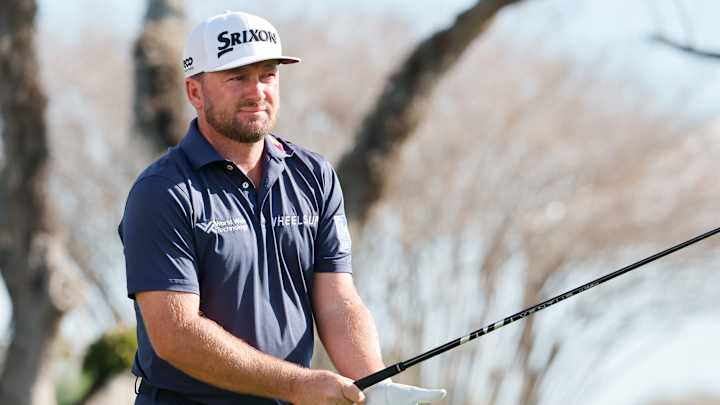With Ryder Cup Captaincy on His Mind, Graeme McDowell Starts Fast at Bay Hill

ORLANDO, Fla. — The Arnold Palmer Invitational wasn’t fooling anyone during Thursday’s first round. Firm fairways; thick rough everywhere, even around the greens; fast putting surfaces.
“It’s a U.S. Open-style setup on a U.S. Open-style golf course,” said Orlando resident Graeme McDowell, a Northern Ireland native who lives near Orlando International Airport at Lake Nona and owns an upscale restaurant in the area, Nona Blue.
McDowell knows a U.S. Open course when he sees one. He won the 2010 U.S. Open at Pebble Beach with a gutsy performance. When he’s on, McDowell ranks among the game’s most accurate drivers. It would be hyperbole to say he can drive it down a bowling alley-width fairway but that does paint the picture and get the message across.
A bogey at his final hole after his approach shot bounded over the green left McDowell with an opening 68, 4-under par. In the morning half of the API, only Rory McIlroy’s 65 was a better score.
You haven’t forgotten the delightful, talkative McDowell, have you? He was a persistent thorn in the side of the U.S. Ryder Cup side for eight years. McDowell was on four European teams and the Euros won the Ryder Cup three times. In Wales, McDowell’s win over Hunter Mahan in the final singles match clinched the Cup for Europe and meant G-Mac, as he is known, will never have to pay for a drink in Wales for the rest of his life.
The last half decade has been spotty for McDowell. He won in Mexico in 2015, a fall event with a lackluster field, and in 2019 in Puerto Rico, a secondary event played opposite the World Match Play Championship. His last win in a regular PGA Tour event was the 2013 Heritage Classic, nearly nine years ago.
He seemed as if he was hitting the prime of his career after the Europeans’ 2014 Ryder Cup comeback win at Medinah. Shockingly, he didn’t make Europe’s next three Ryder Cup teams. It was a crusher in 2020, in fact, when he finished fourth in Hawaii at the start of the season, felt his game was rounding into form and then—boom! The pandemic hit and The Players Championship was canceled after the first round.
Just when he expected to have a strong summer and put himself into the Ryder Cup picture, his game went south. He missed the cut in six of his last eight events and finished 35th in the other two. He started scrambling, looking for answers. He changed coaches and that only added to his confusion.
McDowell did make it to the 2021 Ryder Cup (postponed from 2020), yes, but only as an assistant captain. If something can be an honor and leave a bitter taste at the same time, an assistant captaincy is it.
So, Thursday’s first-round API pairing reminded McDowell of his quandary. He’s 42, turning 43 in July, and was paired with Zach Johnson, recently announced as the U.S. Ryder Cup captain for next year’s matches. The European side hasn’t made anything official yet, although rumors say it’ll be Luke Donald. McDowell, especially after his dry spell of so-so play for the past 18 months, is now one of the names that will be thrown around every two years as a possible selection.
“I’m playing with Zach this week, thinking maybe should I throw my hat in the ring and go with him?” McDowell said. “Part of me would love to because part of me thinks, ‘If I don’t take this one, I might not get it.’ Which would be disappointing. But I don’t think I’m ready.”
The Euros have no shortage of solid candidates. There’s Lee Westwood, who turns 49 next month. England’s Daily Mail reported a while back that he passed on accepting the job. There are other Ryder Cup stars in their 40s, too, such as Henrik Stenson, 46 next month; Sergio Garcia, 42; Ian Poulter, 46; Justin Rose, 42 in July; McDowell and Donald, 44.
The job comes with two big problems. One is that it is filled with distractions and not good for a player’s competitive results. The other problem is vanity. Taking the job is a tacit admission that a player’s best golf is behind him. Westwood nearly won at Bay Hill and at Sawgrass on successive weeks in 2021. Of course, he thinks he’s still got it. McDowell hasn’t won since 2019. Of course, he thinks he’s still got it, too. Probably all of the other European 40-something candidates think that, too.
“Are there 12 better players then me in Europe right now? I’ve got to ask myself that question,” McDowell said. “If I’m out here doing what I’m doing, I have to say there’s not 12 guys better than me and I’m good enough to make the team. I have to have that belief to compete at a high level. If I take the captaincy, then that belief isn’t there.”
No reading between the lines is necessary regarding McDowell’s answer. He wants to prove he’s still that U.S. Open champion-level player. That desire may come at a cost.
“There’s going to be seven or eight guys vying for the next five or six captain’s jobs,” McDowell said. “Someone is going to miss. It opens the debate. Should the captain be great leaders of men or should be it legendary players? We’ll see. Luke Donald would do a great job. Henrik Stenson would do a great job. It’s just a case of which one of these guys wants it.”
What would the order of captaincy look like? Feel free to guess, just remember there’s a true wild card--the defunct-not-defunct Saudi Super Golf League that, if it ever got off the ground and any of these European 40-somethings took the money and ran, could potentially imperil their consideration/eligibility.
Set that aside, though, and pencil in Donald for ’23 in Italy and Westwood or Poulter for ’25 at Bethpage Black in New York. In 2027, the matches go to Adare Manor in County Limerick, Ireland. A prime opportunity for McDowell? Maybe. But there’s still Westwood or Poulter, Stenson, Garcia and Rose on the bench. Breaking into this lineup is like being a backup for the 1927 New York Yankees. Good luck.
“I have to put my individual career first,” McDowell said. “I desperately want to get back to playing consistently well at a high level again rather than the Ryder Cup captaincy maybe taking my attention away.”
There is no age ceiling for being a captain but there is a shelf life for being competitive on the PGA Tour. Few players keep winning past their mid-40s, with notable exceptions such as Vijay Singh, Steve Stricker, Phil Mickelson, Raymond Floyd and Hale Irwin. Oh, and that Nicklaus kid.
Magic can still happen at that age but it is less likely. In Phoenix last month, McDowell hit a drive into the right bunker at the TPC Scottsdale’s short par-4 17th hole. “I would have paid you a thousand bucks for a 4 after my tee shot,” McDowell said later. He splashed out onto the green, then holed an 88-foot putt for birdie.
“It’s been a really tough 18 months,” McDowell said. “I’m just trying to layer good days on good days. Hopefully, those will add up to being in contention and I’ll give myself some chances to win,”
Thursday was a good day at Bay Hill. The next step for McDowell is simple.
Do it again.
